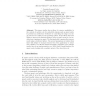Free Online Productivity Tools
i2Speak
i2Symbol
i2OCR
iTex2Img
iWeb2Print
iWeb2Shot
i2Type
iPdf2Split
iPdf2Merge
i2Bopomofo
i2Arabic
i2Style
i2Image
i2PDF
iLatex2Rtf
Sci2ools
103
click to vote
APLAS
2003
ACM
2003
ACM
Controlling and Optimizing the Usage of One Resource
This paper studies the problem of resource availability in the context of mobile code for embedded systems such as smart cards. It presents an architecture dedicated to controlling the usage of a single resource in a multi-process operating system. Its specificity lies in its ability to improve the task scheduling in order to spare resources. Our architecture comprises two parts. The first statically computes the resource needs using a dedicated lattice. The second guarantees at runtime that there will always be enough resources for every application to terminate, thanks to an efficient deadlock-avoidance algorithm. The example studied here is an implementation on a JVM (Java Virtual Machine) for smart cards, dealing with a realistic subset of the Java bytecode.
Related Content
| Added | 05 Jul 2010 |
| Updated | 05 Jul 2010 |
| Type | Conference |
| Year | 2003 |
| Where | APLAS |
| Authors | Antoine Galland, Mathieu Baudet |
Comments (0)

